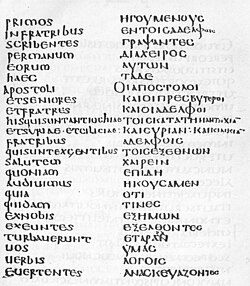Acts 15
| Acts 15 | |
|---|---|
 Acts 15:22–24 in Latin (left column) and Greek (right column) in Codex Laudianus, written about AD 550. | |
| Book | Acts of the Apostles |
| Category | Church history |
| Christian Bible part | New Testament |
| Order in the Christian part | 5 |
Acts 15 is the fifteenth chapter of the Acts of the Apostles in the New Testament of the Christian Bible. It records the journey of Paul and Barnabas to Jerusalem and the Council of Jerusalem. The book containing this chapter is anonymous but early Christian tradition uniformly affirmed that Luke composed this book as well as the Gospel of Luke.[1]
Text
The original text was written in Koine Greek. This chapter is divided into 41 verses.
Textual witnesses
Some early manuscripts containing the text of this chapter are:
- Codex Vaticanus (AD 325–350)
- Codex Sinaiticus (330–360)
- Codex Bezae (c. 400)
- Codex Alexandrinus (400–440)
- Codex Ephraemi Rescriptus (c. 450)
- Papyrus 127 (5th century; extant verses 29–31, 34–36, (37), 38–41)
- Codex Laudianus (c. 550)
- Papyrus 33 (c. 550)
Locations
This chapter mentions the following places (in order of appearance):
Timeline
The journey of Paul and Barnabas to Jerusalem and the Council of Jerusalem is generally considered to have taken place around 48 [2] – 50 AD.
Conflict over circumcision
The circumcision controversy began in Antioch, when 'certain men' (Greek: τινες, certain 'people' in the NIV translation) came from Judea teaching that salvation was dependent on circumcision according to the Mosaic law. The People's New Testament Commentary [3] called them 'the Judaizing Teachers';[4] Paul called them and others with the same teaching 'false brethren secretly brought in'.[5]
The dispute which arose resulted in a decision to send Paul and Barnabas to Jerusalem, to seek a resolution to the issue. In Jerusalem the pro-circumcision case was argued by 'some of the sect of the Pharisees who believed'.[6]
Verse 13
- And after they had become silent, James answered, saying, "Men and brethren, listen to me:"[7]
The council listened to James because he was the first of the three pillars of church (see Galatians 2:9). He was the leader of the church in Jerusalem until he was stoned to death at the insistence of the high priest in AD 62. James was the Lord Jesus Christ's half brother, the one who did not believe until the Lord appeared to him privately after the Resurrection (see 1 Corinthians 15:7).[8]
Verse 14
- Simon has declared how God first visited the Gentiles to take from among them a people for His name.[9]
- "Simon" here from Greek text Συμεὼν, Symeōn,[10] which is used for Simon Peter only here and in 2 Peter 1:1.[11]
See also
References
- ^ Holman Illustrated Bible Handbook. Holman Bible Publishers, Nashville, Tennessee. 2012.
- ^ John Arthur Thomas Robinson (1919–1983), Redating the New Testament, Westminster Press, 1976. 369 pages. ISBN 978-1-57910-527-3
- ^ M. Eugene Boring, Fred B. Craddock, The People's New Testament Commentary, Westminster John Knox Press, 2004
- ^ People's New Testament, http://biblehub.com/commentaries/pnt/acts/15.htm accessed 10 September 2015
- ^ Galatians 2:4
- ^ Acts 15:5
- ^ Acts 15:13 NKJV
- ^ The Nelson Study Bible. Thomas Nelson, Inc. 1997
- ^ Acts 15:14 MEV
- ^ Greek Text Analysis: Acts 15:14.Biblehub
- ^ Strong's Greek Concordance 4826. Sumeón. Biblehub
External links
- Acts 15 King James Bible - Wikisource
- English Translation with Parallel Latin Vulgate
- Online Bible at GospelHall.org (ESV, KJV, Darby, American Standard Version, Bible in Basic English)
- Multiple bible versions at Bible Gateway (NKJV, NIV, NRSV etc.)

